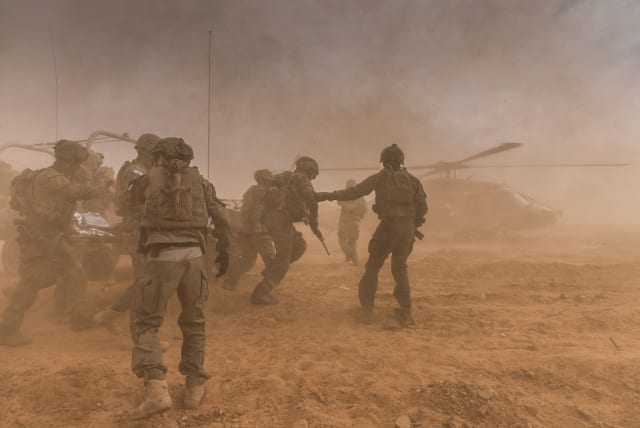'Existential threat': IDF thwarted Oct. 7-like Hezbollah raid on northern Israel, official reveals

"Terrorists in the North were on full alert, ready to act" against Israel after October 7, the official senior explained.
A surprise attack was planned on Israel's northern border in the days following the October 7 Hamas attacks, a senior military official involved in commanding the IDF's operations in southern Lebanon revealed in a Wednesday Maariv interview.
The official emphasized that a repeat or imitation of the October 7 attack is unlikely to occur along Israel's northern border at this stage of the war. He attributed this to the IDF's efforts in neutralizing terror tunnels, clearing dense brushlands, and dismantling nature reserves that had been converted into terror strongholds.Before the IDF's efforts in combatting Hezbollah and dismantling its infrastructure and weaponry, the senior official revealed that early in the operation, some 3,000 terrorists were stationed across southern Lebanon within a three-kilometer strip north of the Israeli border, ready to invade upon receiving orders.
"On October 6, Israel faced an existential threat without realizing it. The terrorists [in the North] were on full alert, ready to act," the official explained.
He added that what prevented a coordinated invasion was the IDF’s rapid deployment of four brigades to Israel's northern border on October 7.
Destroying Hezbollah's element of surprise
"The IDF's deployment neutralized the surprise element in Hezbollah’s plan, and the terrorists realized their plan was no longer feasible since surprise was central to their strategy, just as it was in Gaza," the official added.
During the IDF's operations in the North at the start of the war, it entered Shiite and Sunni villages in Lebanon and discovered a massive stockpile of weapons, including anti-tank missiles, firing positions, and observation posts.
"We destroyed every weapon we encountered, dismantled underground living quarters, and neutralized Hezbollah's capabilities to conduct its planned raid," the official said.
The IDF also uncovered numerous local tunnels in southern Lebanon used by Hezbollah for storage and living quarters, according to the official.
He noted that many of these tunnels were built within particularly dense brushlands—areas of thick vegetation up to ten meters high—which provided terrorists with almost complete cover.
The thickets, located mainly near the Israel-Lebanon border, were uniquely dense, hiding all activity within them, including terrorist movements, weapons, and underground infrastructure.
These covers also allowed Hezbollah to establish firing positions and observation posts and prepare for targeted raids on border communities.
"The thickets served as Hezbollah’s nature shield," the official explained. "Within the dense vegetation, they created hidden pathways for terrorists, concealed heavy weaponry like anti-tank missiles, and even built underground living quarters for long-term storage."
During the operation, the IDF destroyed all weapons found in the tunnels and living quarters.
In addition to eliminating tunnels and weapons, the IDF's primary goal was to remove the concealment advantage provided by the thickets.
"Hezbollah managed to operate under the radar using the thickets," the official noted.
He added that this exploitation posed a significant challenge for the IDF.
The official also addressed how the military has been working to prevent the area from becoming a haven for hostile activity again.
"These areas have been turned into open fields," the official explained. "So, any future attempts by Hezbollah to re-establish themselves will be immediately and effectively monitored."
Even after the IDF demolished these buildings and the weapons within, this was not a long-term solution, as rearming has not been a complex task for the organization in the past.
Finishing the job
"We understood that what we had done so far neutralized Hezbollah’s immediate ability to operate, but it wasn’t enough to guarantee long-term quiet," the official explained. "To prevent a scenario like October 7 from recurring, we needed to finish the job."
As part of the effort, houses near the border that Hezbollah had used for storing and manufacturing weapons were completely destroyed, the official said. The IDF reportedly held a firm stance that homes in southern Lebanese villages, from the border up to three kilometers into Lebanon, would not be allowed to be rebuilt, even after an agreement.
During the operation, tunnels up to 70 meters long were discovered. These tunnels were equipped for extended stays with supplies sufficient for six months.
"Opposite every Israeli community, a Hezbollah company was waiting to infiltrate upon receiving orders. Today, they no longer have the tunnels, underground rooms, or brushlands that concealed them," the official noted.
Only after the area was completely cleared could northern residents begin to consider returning to their homes.
"Residents we met expressed their emotions, saying they felt safe for the first time," said the official.
According to him, the IDF has established new military outposts at the forefront of border communities.
"We will not rely on Hezbollah respecting agreements or solely on intelligence warnings. The security of northern residents is based on the presence of IDF soldiers on the ground," he said.
"The fighting in the North underscored the importance of coordinated and comprehensive actions, along with the determination and resilience of the reservists and their families. This was a historic campaign to restore the security of Israel’s northern border residents," the official concluded.
Jerusalem Post Store
`; document.getElementById("linkPremium").innerHTML = cont; var divWithLink = document.getElementById("premium-link"); if (divWithLink !== null && divWithLink !== 'undefined') { divWithLink.style.border = "solid 1px #cb0f3e"; divWithLink.style.textAlign = "center"; divWithLink.style.marginBottom = "15px"; divWithLink.style.marginTop = "15px"; divWithLink.style.width = "100%"; divWithLink.style.backgroundColor = "#122952"; divWithLink.style.color = "#ffffff"; divWithLink.style.lineHeight = "1.5"; } } (function (v, i) { });

